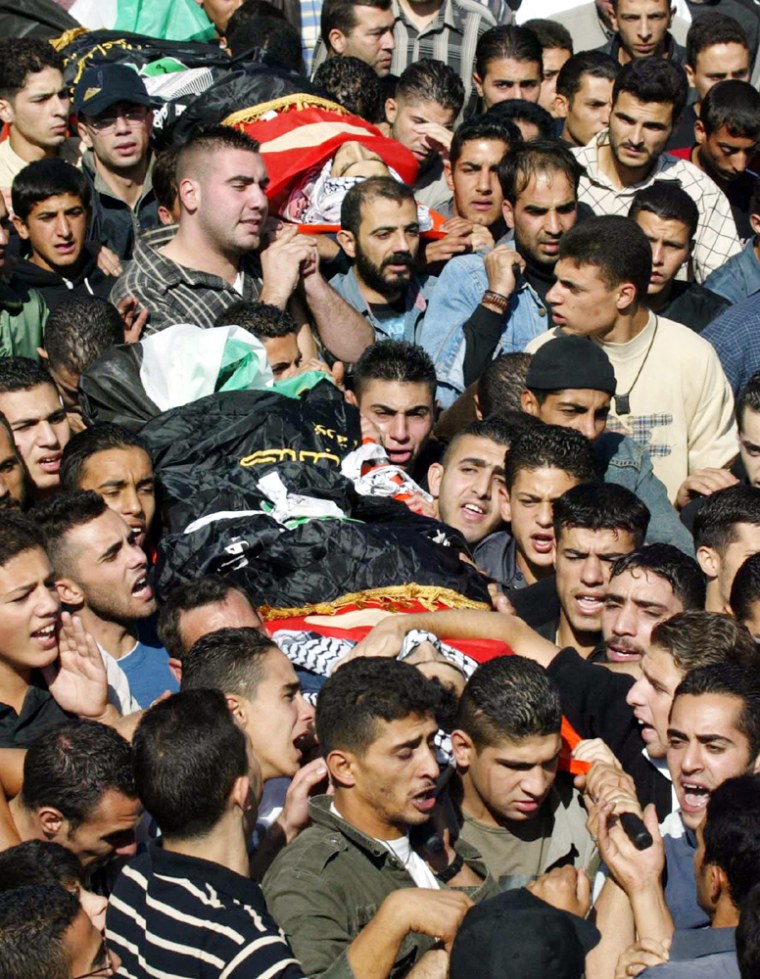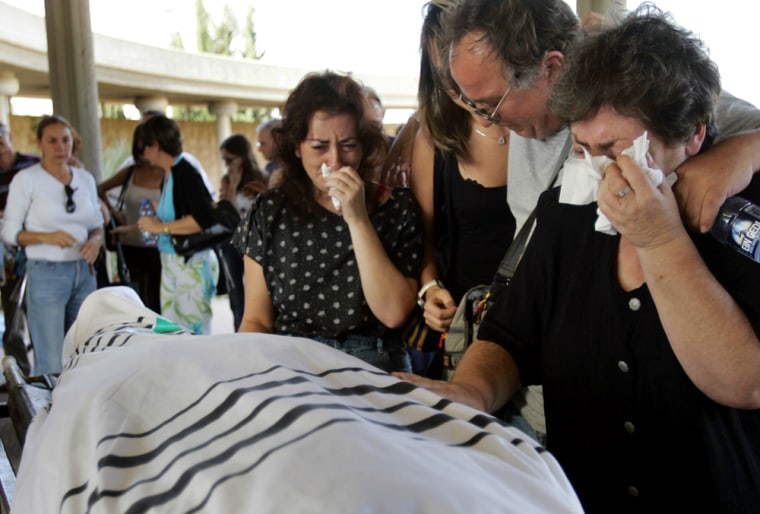Israeli troops on Tuesday destroyed the homes of a teen suicide bomber and two men who dispatched him to a crowded Tel Aviv market where he killed three Israelis and wounded 32.
The relatively muted response came after Israel pledged to show restraint in the wake of Yasser Arafat's illness.
The usual signs of an imminent Israeli military counterstrike — the hurried high-level security meetings and troop movements — were absent this time, and it appeared that Israel would not hit back as it has in the past.
Troops razed the home of the bomber, 16-year-old Eli Amer Alfar, and damaged four neighboring houses in the crowded Askar refugee camp near Nablus, witnesses said.
Alfar’s family of 12 had already removed belongings, knowing that Israel as a deterrent routinely destroys the homes of those involved in attacks against Israelis.
The army also destroyed the homes of two senior members of the Popular Front for the Liberation of Palestine. The radical PLO faction claimed responsibility for Monday’s blast, and the Israeli military said the two had dispatched the bomber.
Militants slain
In Nablus, Israeli undercover troops late Monday killed three Palestinian militants affiliated with Arafat’s Fatah movement in a gunbattle in the Casbah, the city’s crowded center.
Witnesses said some of the soldiers disguised themselves in the head-to-toe coverings of Muslim women and carried trays of sweets as they approached the militants sitting in a coffee shop.

Palestinian witnesses said the soldiers opened fire without warning, killing two wanted men. The army said the fugitives had drawn pistols before they were shot.
Three other militants joined in the battle and the army brought in reinforcements, killing a third gunman. One man was seriously wounded and a fifth escaped, the army said. The troops later raided a Red Crescent clinic looking for the wounded man but failed to find him, witnesses said.
Military officials said the target of the raid was Majdi Murai, a leader of the Al Aqsa Martyr’s Brigades, a violent group with ties to the Fatah movement. Murai was responsible for recruiting a number of teenage boys for suicide attacks, they said.
Murai survived an attempt on his life last month.
Frustrated by Israeli security measures that have greatly reduced their effectiveness, militant groups have turned to using teenagers and women to transport explosives and carry out attacks, hoping they would raise less suspicion at the dozens of Israeli checkpoints designed to capture bombers.
The Tel Aviv bomber was only 16, one of the youngest Palestinian suicide bombers, and his parents lashed out at the militants who recruited him.
“It’s immoral to send someone so young,” said Samir Abdullah, 45, Alfar’s mother. “They should have sent an adult who understands the meaning of his deeds.”
Monday’s bombing was the 117th suicide bombing since the outbreak of Israeli-Palestinian fighting in 2000 and was the first since Arafat left for France last week. In all, 494 Israelis have been killed in the attacks.
Arafat condemns attack
Arafat condemned the bombing from his hospital room outside Paris, and Palestinian leaders in the West Bank joined in, but the bombing undermined their efforts to show that despite the absence of their longtime leader, everything is under control.
“(Arafat) appealed to all Palestinian factions to commit to avoid harming all Israeli civilians and he appealed to Sharon to take similar initiatives to avoid harming Palestinian civilians,” Arafat’s spokesman, Nabil Abu Rdeneh, said in France.
Arafat was flown to France last week, suffering from an undisclosed ailment that left him in serious condition. Doctors there have not yet announced results of medical tests.
Using general terms, Israeli Prime Minister Ariel Sharon denounced the suicide bombing and pledged action.
Sharon said Israel “will not stop its war against terrorism” and repeated his commitment to unilaterally disengage from the Palestinians, pulling out of the Gaza Strip next year.
“I’m not changing my policy until there are changes in the Palestinian administration and until it stops its incitement and its terror,” Sharon said.
Israeli officials had said they would show restraint in military operations to give the Palestinian leadership a chance to maintain order.
